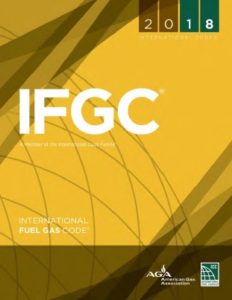International Fuel Gas Code 2018
International Fuel Gas Code 2018
The International Fuel Gas Code 2018 is kept up to date through the review of proposed changes submitted by code enforcement officials, industry representatives, design professionals and other interested parties. Proposed changes are carefully considered through an open code development process in which all interested and affected parties may participate.
The ICC Code Development Process reflects principles of openness, transparency, balance, due process and consensus, the principles embodied in OMB Circular A-119, which governs the federal government’s use of private-sector standards. The ICC process is open to anyone; there is no cost to participate, and people can participate without travel cost through the ICC’s cloud-based app, cdp- Access. A broad cross section of interests represented in the ICC Code Development Process. The codes, which updated regularly, include safeguards that allow for emergency action when required for health and safety reasons.
You can also Read International Code Council Performance Code for Buildings and Facilities 2018
International Fuel Gas Code 2018 Content
- SCOPE AND APPLICATION
![International Fuel Gas Code 2018]()
- ADMINISTRATION AND ENFORCEMENT
- DEFINITIONS
- GENERAL REGULATIONS
- GAS PIPING INSTALLATIONS
- CHIMNEYS AND VENTS
- SPECIFIC APPLIANCES
- GASEOUS HYDROGEN SYSTEMS
- REFERENCED STANDARDS
- A: SIZING AND CAPACITIES OF GAS PIPING (IFGS)
- B:SIZING OF VENTING SYSTEMS SERVING APPLIANCES EQUIPPED WITH DRAFT HOODS, CATEGORY I APPLIANCES AND APPLIANCES LISTED FOR USE WITH TYPE B VENTS (IFGS)
- C: EXIT TERMINALS OF MECHANICAL DRAFT AND DIRECT-VENT VENTING SYSTEMS (IFGS)
- D: RECOMMENDED PROCEDURE FOR SAFETY INSPECTION OF AN EXISTING APPLIANCE INSTALLATION (IFGS).
The International Fuel Gas Code (IFGC) is a model code that regulates the design and installation of fuel gas distribution piping and systems, appliances, appliance venting systems, combustion air provisions, gaseous hydrogen systems and motor vehicle gaseous-fuel-dispensing stations. The definition of fuel gas includes natural, liquefied petroleum and manufactured gases and mixtures of these gases.
The IFGC applies to all occupancies including one- and two-family dwellings and townhouses.Therefore, whether using the IFGC or the IRC, the fuel gas provisions will be identical.


Comments are closed.